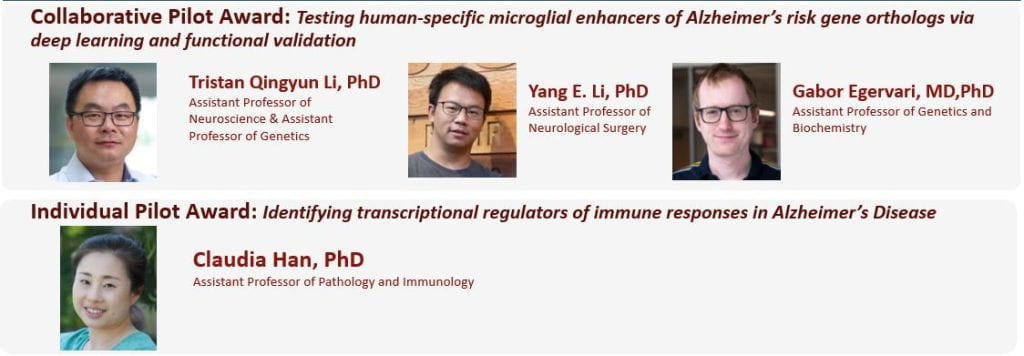We are excited to announce the winners of the NeuroGenomics and Informatics (NGI) Pilot Grant Program 2024, a funding initiative aimed at supporting research leveraging multi-omic approaches to understand the biology of neurodegenerative diseases
For more information about the Pilot Awards please see: NGI Pilot Grant | NGI | WUSTL
We are delighted to award the following grants:
1. Individual Grant: Recipient: Dr. Claudia Han (Pathology – Immunobiology) – Identifying transcriptional regulators of immune responses in AD
Summary: Alzheimer’s Disease is a type of dementia that affects a large number of people worldwide. There are two forms of Alzheimer’s Disease: familial (FAD) and sporadic (SAD), which have different genetic causes. In both forms, there are changes in the brain like the buildup of proteins called amyloid and tau, which lead to the death of brain cells and shrinkage of the brain. FAD progresses more quickly than SAD and can cause changes in behavior and mental health symptoms. Research in mice and humans has shown that a type of brain cell called microglia plays a role in the development of Alzheimer’s Disease. However, studying microglia outside of the brain is challenging because they change rapidly. Induced pluripotent stem cells, which can be made from a person’s skin or blood, offer a way to study Alzheimer’s Disease and immune dysfunction in a controlled environment. This research proposal aims to use induced pluripotent stem cell-derived microglia from FAD and SAD patients to understand how genes influence microglia behavior. The goal is to identify new targets for therapy.
2. Collaborative Grant: Recipients: Drs. Tristan Li (Neuroscience & Genetics), Yang Li (Genetics & Neurosurgery), Gabor Egervari (Genetics & Neurosurgery) – Testing human-specific microglial enhancers of Alzheimer’s risk gene orthologs via deep learning and functional validation
Summary: Recent research has found that certain variations in genes associated with Alzheimer’s disease (AD) are more commonly found in specific parts of the DNA that control gene activity in microglia, a type of brain cell. This discovery has led to a new approach to studying how these genes and DNA regions contribute to the risk of developing AD. The plan is to introduce artificial enhancers into the DNA of mice to activate similar genes related to AD. By analyzing the DNA and using advanced computer models, scientists will design these artificial enhancers to mimic the ones found in humans and predict how they can activate the corresponding genes in microglia. To confirm their function, researchers will use a technique called CRISPR/Cas9 to test the effects of these artificial enhancers on microglia cells in the lab and in live mouse models of AD. This innovative project aims to uncover the role of these specific DNA regions in microglia in increasing the risk of AD. In the future, this approach could help scientists understand how genetic variations in these regions contribute to the development of AD.
